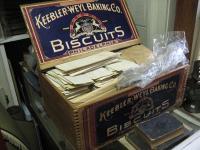The Historical Society of Pennsylvania offers helpful resources for National History Day (NHD), and of course, boasts many archival collections to support student research. However, for students and teachers particularly interested in local history, or who live far from HSP and want to find primary-source documents close to home, a small repository may be a good place to do research.
What is a "small repository"? There are numerous small, primarily volunteer-run historical societies and historic sites with archival collections in the five-county Philadelphia area. To support these organizations and publicize their archival holdings, the Historical Society of Pennsylvania undertook "The Hidden Collections Initiative for Pennsylvania Small Archival Repositories" (HCI-PSAR) with funding from the Andrew W. Mellon Foundation.
Since the HCI-PSAR project began in the fall of 2011, many important, heretofore hidden archival resources have been uncovered. These underutilized collections are ripe for research and may inspire students who are passionate about local history or are looking for more accessible primary-source resources. Many of the collections held at small repositories go beyond local history, documenting issues and topics of national and even international significance.
Following are a few collections that document topics relating to the NHD 2014 theme, "Rights and Responsibilities."
- Eastern State Penitentiary Historic Site, Inc.. Eastern State Penitentiary oral history project, 1993-2012 (ESP.02). When it opened in 1829, the State Penitentiary for the Eastern District of Pennsylvania ("Eastern State Penitentiary") was the world's first true "penitentiary" in the sense that it was designed to inspire true feelings of penitence in the hearts of inmates. Initially characterized by its system of strict isolation and grand architecture, more than 300 prisons on five continents were modeled after Eastern State Penitentiary. Over 142 years of operation, the system of isolation was gradually abandoned and the penitentiary became a traditional modern prison; in 1971, the facility was closed. The Eastern State Penitentiary oral history project, 1993-2012, consists of about 130 oral history interviews with former inmates, employees of the State Penitentiary for the Eastern District of Pennsylvania ("Eastern State Penitentiary"), family members of employees, and volunteers such as Chaplains.
- Various collections on LGBT individuals and organizations are held at the John J. Wilcox Jr. LGBT Archives of Philadelphia
- Historical Society of Montgomery County. Dr. Hiram Corson family papers, 1827-1896 (HSMC.12). Dr. Hiram Corson (1804-1896) was a practicing physician, and an advocate for abolitionism and women in medicine. He was instrumental in passing a law in Pennsylvania that put the female insane in the care of women physicians. The Dr. Hiram Corson family papers, 1827-1896, consist primarily of the papers of Dr. Hiram Corson, with a small amount of materials by other family members. The highlight of the collection is the diaries of Dr. Corson, which date from 1848 to 1896.
To find other collections that relate to this year’s theme, and to get a better sense of the types of collections held at small repositories, HCI-PSAR staff have created an easily navigable subject guide. For descriptions of other archival collections uncovered during the HCI-PSAR project, we recommend browsing the HCI-PSAR finding aids website, hosted by the Philadelphia Area Consortium of Special Collections Libraries. There, you can view all of the archival collections at the small repositories that have participated in our project. Finding aids are being added to both the subject guide and finding aids website on an ongoing basis, so check back frequently.
You can also see what small repositories are in your area by browsing an interactive map of participating HCI-PSAR small repositories.
Keep in mind that staffing and resources vary at small repositories, so students may not get the same level of assistance and support that they would receive at the Historical Society of Pennsylvania. However, some small repositories do have professional staff members, many are "staffed" by volunteer retired teachers, and several are even hosting pre-service teachers to create lesson plans with primary-source documents as part of the National Archives' Cultural Collaboration Fieldwork Initiative.
HCI-PSAR staff hope that these resources will prove helpful in familiarizing teachers and students with the many small historical societies and sites that can be found in the Philadelphia area, and the important archival collections and primary-source materials that they hold!

